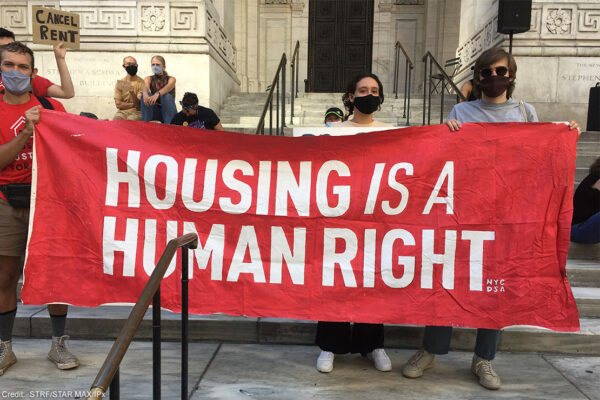By Taylor Dixon
Taylor Dixon is pursuing her Master of Social Work degree at UNR and works on housing issues for the ACLU of Nevada. This article originally ran in the Nevada Current.
In my position at the ACLU of Nevada in Reno, I sometimes walk along the river or around 4th Street, and see campsites with unsheltered community members. They almost always say they could not get into a temporary shelter and had to resort to staying outside.
It’s clear to me and anyone paying attention that our resources for the unsheltered are already overwhelmed. Now imagine adding thousands more Nevadans to the unsheltered population when eviction protections expire March 31.
It is no secret that Nevada has a housing crisis that has perpetuated for over a decade. This housing crisis, at its core, is a racial justice issue. According to a Guinn Center report on the impact of COVID-19 in communities of color, as many as 500,000 Nevadans are at risk of eviction, of which two-thirds are people of color. This is just one of many examples of how the pandemic has exacerbated systemic racial injustices.
Assembly Bill 141 creates a sealing of evictions for those who have been evicted during the COVID-19 pandemic because they could not pay their rent. It also extends the time some tenants have to find new housing when they are being evicted for no cause.
Prior to the COVID-19 pandemic, many people of color were already struggling in Nevada. Data from the US Census Bureau shows us that poverty in these communities has continued to increase from the years 2007 to 2018, with 2018 rates higher than during the Great Recession. While poverty in white communities has steadily decreased, Black communities maintain poverty rates greater than 20 percent. Already at an economic deficit, faced with higher COVID mortality rates, and now experiencing a risk of eviction that may tarnish new opportunities for housing, this is a racial justice issue that cannot be ignored.
Nevada’s Black and Brown communities are among the hardest hit by COVID-19 across infection, hospitalization, and death rates. Black and Brown people have been nearly twice as likely to die from the virus as white people. This disparity is further amplified at the intersection of race and housing.
Before the COVID-19 pandemic, Black renters received a disproportionate share of all eviction filings, and they continue to be over-represented during the pandemic, according to the Eviction Lab. This population to eviction discrepancy highlights the nature of the racial barriers in housing in Nevada.
During Thursday’s hearing on AB141, real estate industry lobbyists and opponents of the bill implied this legislation would end up taking food off of the table for Nevada landlords. That simply isn’t true.
What AB141 will do is lessen the burdens that our struggling communities have to take on during this already traumatic time. AB141 seals eviction records for all Nevadans that were evicted for not being able to make rent during the COVID-19 emergency and increases the timeline to a more fair length for those being evicted for “no cause.”
Without the passage of AB141, vulnerable Nevadans will have an eviction on their record which will jeopardize their chances of securing new housing. This will create new barriers to good housing by pushing families out of their areas with established resources. The domino effect can extend to where kids go to school, the ability to secure technology during a still heavily remote time, and create a cycle of poverty and homelessness that can punish people for years to come.
Opponents say a provision meant to extend the timeline for those who have been served a “no-cause eviction” will give tenants a window in which they do not have to pay rent. Again, this is not true. For no-cause evictions — those in which the tenant has done nothing wrong and the property owner simply wants them out — AB141 only extends the notice given to the renter to find another place to live, to 60 days for those who have lived in the home for 1 to 3 years and 90 days for those who were in the home for 3 or more years.
Nevada leaders have declared racism is a public health crisis, and this is absolutely true when it comes to housing. As they say, housing is health care. The ACLU of Nevada believes housing is a human right. Therefore, the intersection between systemic racism and housing justice should be a major priority for the Nevada Legislature.
The passage of AB141 is essential to help tenants during this unprecedented time. I urge the people of Nevada to contact their legislators and tell them to support this bill and other policies that will bring greater housing security to Black and Brown Nevadans and everyone.

